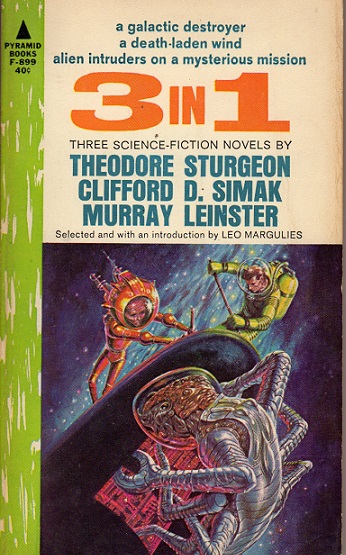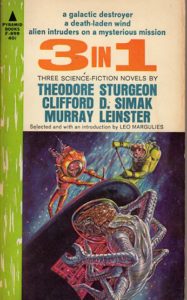Book Review: Three In One edited by Leo Margulies
According to the introduction by the editor, this book came about because there were three long science fiction stories in the to-publish pile, too long for short-story collections but too short to be their own paperback. The cover by Emsh is a good choice with the three intelligent species cooperating in some vacuum-suited endeavor. It doesn’t precisely match any of the stories inside, but gets across the ideas of “three” and “science fiction” nicely.
“There Is No Defense” by Theodore Sturgeon takes place in a far future when the races of the Solar System have devised a weapon so fearsome it is only known as the Death. This won the war against the Jovians, but so horrified everyone that there is now a complete ban against it, sponsored by the interplanetary Peace organization.
Now an invader ship has entered the system. It will not communicate. Its movements are seemingly random, as are its attacks with the power to slag small moons. Its defenses seem to make it immune to any normal weapon, and it retaliates instantly and overwhelmingly to any attack. And this is just one ship, presumably a scout for the main invasion.
It appears that there is no choice but to un-ban the Death, regardless of the damage to the Peace movement’s ethical standing. But what if the invader is immune to the Death? What then?
The story fudges on the difference between pacifism and passivism (as a lot of stories not written by pacifists do), but does show respect for the pacifist’s point of view. The invader’s secret will be more easily guessed by modern readers than the characters in the story, I think.
“Galactic Chest” by Clifford D. Simak is contemporary to 1956, when it was published. A Midwestern reporter chafes at his daily assignment of writing puff pieces for the Community Chest (a charity organization, forerunner of United Way; you may have seen the Monopoly cards.) He wants to become a foreign correspondent and cover international stories!
The newspaper editor (nicknamed “the Barnacle”) doesn’t seem to be helping, sending our protagonist off on a series of stories that seem to be wild goose chases. Finally told point-blank by the Barnacle that good reporters find their own stories, the reporter looks again at those and other incidents and notices a pattern. A pattern reminiscent of brownies (the creatures, not the confections.)
This light-hearted story is closer to fantasy than science fiction, just substituting aliens for elfin creatures. A couple of the “helpful” things they do come across as disturbing (they are okay with euthansia), but overall it’s a happy ending. The main characters drink heavily (a bartender supplies a clue to what’s going on), and it’s strongly implied that the reporter and his love interest engage in hanky-panky before marriage.
“West Wind” by Murray Leinster is set in Eastern Europe of the then near future, though country names are very carefully not used. Igor is a proud citizen of a small, militarily weak country. They have atomic power plants, true, but their neighbor to the east has actual atomic bombs, enough to turn Igor’s country to glass. The country to the east is large and militarily powerful, and has already bullied Igor’s country into ceding over one of its provinces to them.
Now the eastern nation has demanded another border province. The President of Igor’s nation has agreed to cede this province as well, without a shot fired, just all the citizens evacuated. The President did warn that any soldier entering the province would be doing so at their own risk, but that was a bluff, right?
Igor is incensed. He knows full well that the aggressor nation will not be satisfied with this bite of territory; they will soon find some excuse to demand more, or even invade outright! Igor decides to hide from the evacuation teams with a radio transmitter (he’s a news broadcaster by profession) so that he can send messages back to his people to shame them into resisting the invaders.
Igor doesn’t even get one broadcast off before he’s caught by the invaders and arrested as a spy. As the only living resident of the province, the eastern nation believes he must know something about what the President meant in his speech. Igor makes up some stories under torture, but he has no clue whether or not the veiled threat was a bluff, or what trap could possibly have been laid. The only comfort he has is an old nursery rhyme about the West Wind protecting his homeland.
There are some evocative scenes in this one, from the solitude Igor faces in the abandoned province, to a chilling calculus as the eastern dictators decide how many of their own troops need to die to make their planned invasion look like a fair fight.
The reveal itself seems unlikely given advances in our knowledge of that field of science; to quote Morbo, “it does not work like that!”
This is mid-level work by a trio of excellent authors, worth looking up if you are a fan of any of them. It doesn’t seem to have been reprinted recently so try used book stores and libraries.


